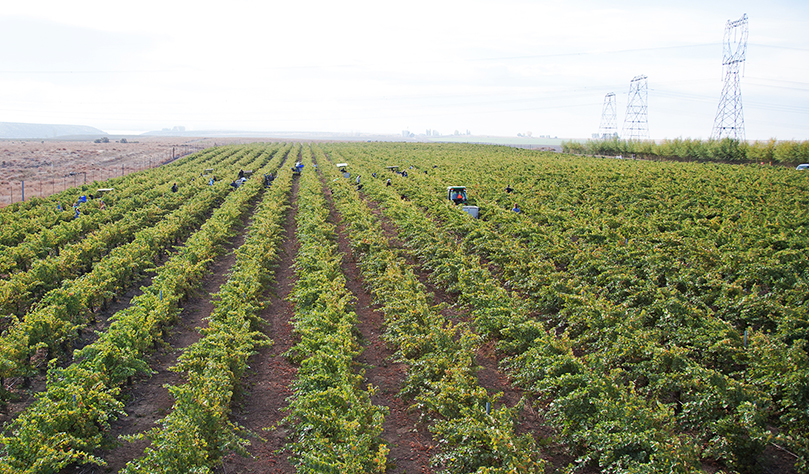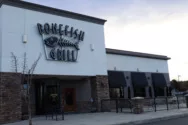
Home » Paterson farmer making water from wine
Paterson farmer making water from wine
Sandpiper Farms creates Water from Wine nonprofit to fund clean water work

June 13, 2019
In a way, the family behind the local nonprofit Water from Wine is bringing the first miracle of Jesus turning water into a wine into a modern-day context, leveraging the rich wine-growing potential in the vineyard at Sandpiper Farms with the global need for clean drinking water.
The nonprofit’s name, Water from Wine, is the eventual outcome of the organization’s process.
Pat Tucker, the owner of Sandpiper Farms, came up with the model and idea, merging his work at the farm with his desire to give back.
Tucker grows grapes on the six-acre vineyard and then has local winemakers make the wine.
The nonprofit sells the wine and donates proceeds to clean water charities working in communities around the world.
The idea for Water from Wine, Tucker said, came from his involvement with his church’s mission in rural Honduras. A member of Hillspring Church in Richland, Tucker has been to Africa twice and said his trips exposed him to the global need for water.
“It was very profound to me,” he said.
Tucker has been a farmer in the region for decades, starting Sandpiper Farms in 1974, and he sees Water from Wine as a part of God’s plans for him after being abducted and tortured by two former employees in 1996.
Tucker survived and experienced a spiritual conversion that night. He credits his life and work today to that purpose.
In 2014, he was struggling with the vineyard on his property and considering different options for it, from selling it to tearing it out.
Then he got an idea.
“It kind of just dawned on me that if I did something good with the proceeds from that vineyard, that I’d take better care of it, and that’s in fact what happened,” he said.
He had never made wine from the vineyard’s grapes before, and he knew he would need help. He didn’t have to look much further than his own kin.
Jamie Ssenkubuge, the executive director of Water from Wine, is Tucker’s daughter.
With a background in global nonprofit work and a degree in global development, Ssenkubuge moved back to the Tri-Cities in 2016 after a five-year stint living abroad and working for several nonprofits.

Water from Wine has a fairly straightforward model. The Sandpiper Farms vineyard is six acres and its grapes can produce 1,000 cases of wine.
Tucker grows grapes that can be made into cabernet sauvignon and rosé, and soon he plans to donate the vineyard to the nonprofit, too.
Each fall, volunteers come to harvest the grapes, and the fruit is sent to different local wineries.
Volunteers enjoy a meal in the aptly-named Cana Lodge at the vineyard for their efforts.
Water from Wine then sells the rosé and the cabernet sauvignon, made by Horse Heaven Hills Winery, with 100 percent of the proceeds from each bottle sale going to nonprofits supporting clean water globally.
Water from Wine coordinates and works with a handful of nonprofits whose mission is to bring communities fresh water globally.
It had donated more than $300,000 as of May 2019 to various nonprofits, which Tucker says makes all the work worth it.
“My most favorite thing of this whole job is signing the checks that go to those nonprofits. It makes me feel like it’s all worthwhile when I can sign a check and put it in the mail,” he said.
Water from Wine has donated more than $230,000 to date to Seattle-based nonprofit Water1st International, its biggest partner, although the nonprofit partners with several nonprofits working in the water sector—mainly ones based on the West Coast.
Ssenkubuge audits the practices of nonprofits Water from Wine donates to to ensure they are building sustainable water infrastructures in communities that will last.
“I love knowing that they are not just going into communities and building a well or a water system, and then leaving never to be seen again, but they really invest their time in these communities and trust the local leadership to be involved,” she said.
Water From Wine sells wine direct-to-consumer only, either online and in its two tasting rooms — one in Paterson and one in Leavenworth.
Because their grapes only yield two types of wine, Ssenkubuge and Tucker sell other Tri-City wines, including some white wines, as well as a variety of red wines, in their tasting rooms.
While Paterson Cellars is a licensed winery, they do not make wine themselves.
The Leavenworth tasting room opened last summer — and Ssenkubuge said that business is going well.
“We’re happy with the way it’s going, but it would be great to just continue seeing more sales happen there, and the more sales that happen, the more we can give away,” she said.
The Leavenworth tasting room has proven to be the busiest, as it is in a more touristy area with other wineries offering tastings and can attract customers from both the eastern and western parts of the state.
The Paterson tasting room, connected to the actual vineyard, offers tastings by appointment.
Water from Wine recently started a wine club that allows people to sign up for a subscription service to pay a set price and receive three shipments throughout the year.
For as low as $50, the club memberships have discounts and tasting advantages. Ssenkubuge said many members give their wine away as gifts, including those who aren’t wine-drinkers themselves.
Currently all the profits from the wines made with the Sandpiper vineyard grapes (the Horse Heaven Hills cabernet sauvignon and the rosé) are donated to nonprofits, while Water from Wine sales of other local wines in its stores and wine club packages help offset operating costs.
For now, Sandpiper Farms has taken on the overhead costs of maintaining the orchard, as well as paying for wine production but Tucker hopes to shift that model into a more self-supporting operation in the coming years.
He is looking for companies or individuals to sponsor a row of his orchard for $3,000, which is worth the price tag for the outcome.
Each row of grapes yields about 40 cases of wine, which means the retail sale (and eventual donation) is valued at about $14,400 per row.
“You’re actually leveraging your donation by our efforts, marketing and volunteers and other donations because I do expect to continue donating overhead and staffing,” Tucker said.
Water from Wine still is relatively small, due to the vineyard’s size and its current model. Its wine is not sold in stores; it can only be bought online or in the Paterson or Leavenworth tasting rooms. It does sell and ship wine through its website to Washington, Oregon and California.
To volunteer for the harvest or learn more about Water from Wine and tasting times, go to waterfromwine.org.
Local News Charitable Giving & Nonprofits Viticulture
KEYWORDS june 2019




